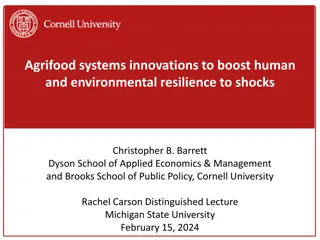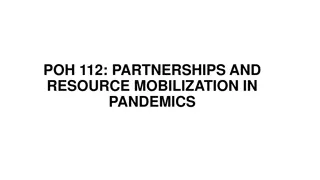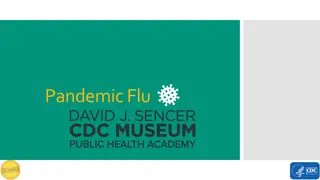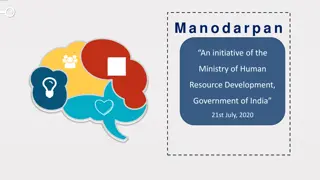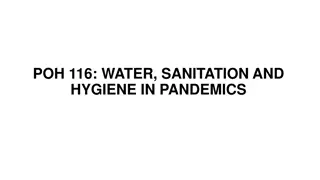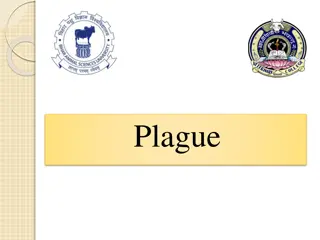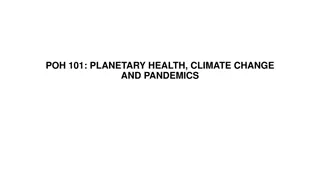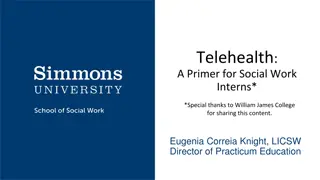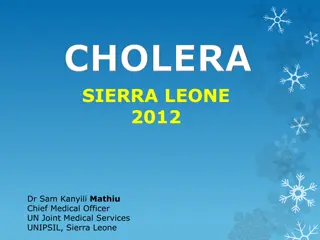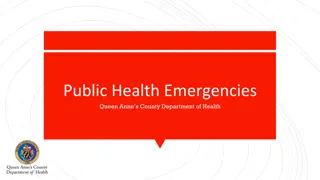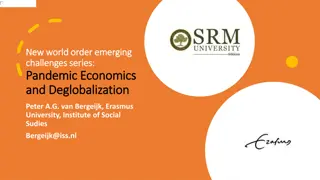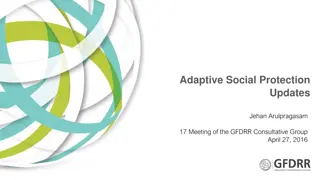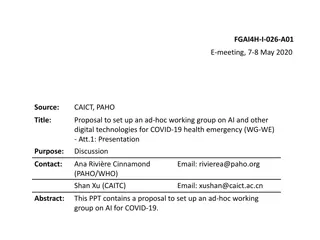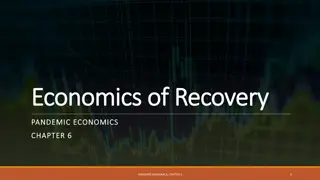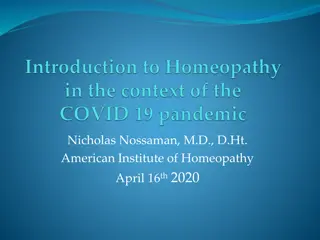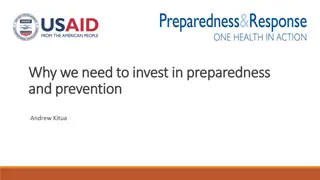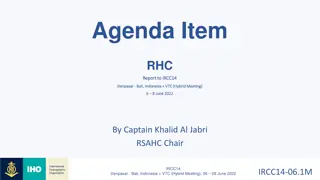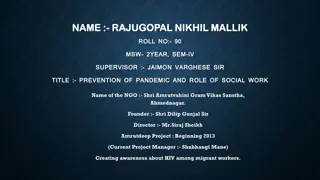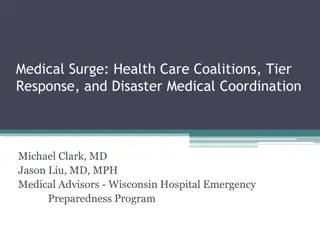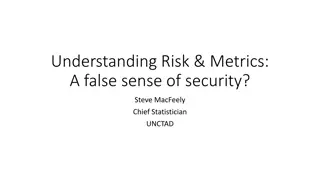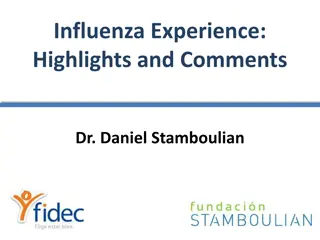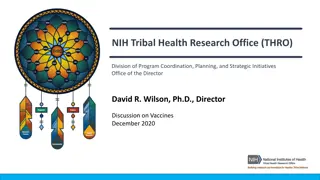A Scientific Approach to Pandemic Preparedness
Barney S. Graham, MD, PhD, outlines a scientific framework for epidemic and pandemic research preparedness to achieve fast and equitable access to high-quality vaccines for future pandemics. The discussion covers new human viral pathogens, 21st-century viral threats, viral taxonomy, and a prototype
0 views • 16 slides
Future Challenges and Opportunities in the Asia-Pacific Region
The rapid acceleration of societal development, as highlighted by Alvin Toffler, coupled with sudden and revolutionary changes in various aspects of human life, presents both prosperity and challenges. The future trends indicate increasing complexity, necessitating collaboration, interdependence, an
1 views • 20 slides
Enhancing Agrifood Systems for Resilience Amidst Shocks
Explore how innovations in agrifood systems can bolster human and environmental resilience against various shocks like climate change, conflicts, pandemics, and more. Emphasis is placed on addressing poverty traps, understanding natural vulnerability to shocks, and transforming agrifood systems for
2 views • 17 slides
Understanding Molecular Dynamics: Insights from Across Scales
Exploring molecular dynamics from molecules to pandemics, this presentation delves into the intricate energy landscapes of molecular systems, sampling problems, advanced techniques, and analysis of simulations to uncover valuable insights crucial for various scientific disciplines like drug discover
5 views • 21 slides
Understanding Mental Health and Pandemics
This module delves into mental health terminology, the impact of pandemics on mental well-being, identifying mental distress, tools for prevention and response, and providing support during acute phases of mental health issues. Learners will gain knowledge on various concepts related to mental healt
0 views • 14 slides
Understanding Resource Mobilization for Pandemic Preparedness
This topic delves into partnerships and resource mobilization strategies essential for combating pandemics. Learners will gain knowledge on engaging partners, coordinating resources, and the importance of mobilizing different types of resources such as financial, technical, human, and institutional.
0 views • 18 slides
Evolution of Oxygen Flowrates in Healthcare Settings
Discussions around oxygen flowrates in healthcare facilities, especially in the context of the COVID-19 pandemic, highlight the need for a review of current guidelines. The existing (S)HTM 02-01 guidance, developed around 20 years ago, is being reevaluated to align with modern clinical practices. Pr
0 views • 11 slides
Understanding Pandemic Influenza: Causes, Impacts, and Preparedness
Influenza pandemics have historically caused significant casualties, with the most notable being the 1918 H1N1 pandemic flu that resulted in approximately 50 million deaths. Understanding how diseases like the flu can cause a pandemic is crucial, including the groups most vulnerable and the necessar
1 views • 15 slides
Understanding Manodarpan Initiative for Mental Health Well-being
Manodarpan is an initiative by the Ministry of Human Resource Development, Government of India, focusing on mental health well-being. It addresses the importance of holistic health, including physical, social, emotional, and mental aspects. The initiative aims to help individuals cope with daily str
0 views • 28 slides
Understanding Orthomyxoviridae: Key Points on Influenza Viruses
Influenza viruses belong to the Orthomyxoviridae family and are major contributors to respiratory epidemics and pandemics. They consist of three genera - Influenza A, B, and C - with distinct morphological characteristics and genetic makeup. By exploring the properties, classification, and morpholog
0 views • 62 slides
Improving Water Quality, Sanitation, and Hygiene in Pandemics
This topic discusses the importance of Water, Sanitation, and Hygiene (WASH) in preventing emerging pandemics, emphasizing the One Health approach. Learners will explore WASH principles for disease control, gender roles in pandemic response, and how to utilize the One Health approach to address WASH
0 views • 32 slides
Insights into the Plague: Epidemiology, Etiology, and Outbreaks
The Plague, caused by Yersinia pestis, has a chilling history spanning pandemics like the Justinian Plague and the Black Death. Understanding its etiology, family, and pathogenicity is crucial. This deadly disease has had notable outbreaks in India, emphasizing the importance of recognizing its host
0 views • 24 slides
Understanding Planetary Health, Climate Change, and Pandemics
This educational content delves into the concepts and principles of planetary health and climate change, exploring the interrelationships between ecosystems, animals, and human health. It highlights the far-reaching effects of human and animal interactions on the environment, emphasizing practical i
0 views • 20 slides
Long-Term Strategy for Safety Standards in Radiation
Inputs from the 9th Term Radiation Safety Committee for the Long-Term Strategy are discussed, including the formation of an e-WG, the questionnaire development, and areas of focus such as environmental impacts, safety assessment, communication, and regulatory effectiveness. The document outlines the
2 views • 9 slides
The Impact of Pandemics on the Shadow Economy Performance
Pandemics have a significant impact on the shadow economy, influencing the legal economy in various ways. The shadow economy serves as a buffer for high unemployment rates and can contribute to budget revenues through legal spending. Studies suggest that a growing shadow economy may reflect dissatis
0 views • 12 slides
Exploring the Benefits of Telehealth for Social Work Interns
Telehealth offers numerous advantages in social work practice including improved access to treatment, cost-effectiveness, flexibility for clients and providers, and continuation of care in challenging circumstances like pandemics. The effectiveness of telemental health has been well-documented throu
0 views • 17 slides
Understanding Cholera - Causes, Symptoms, and Prevention Strategies
Cholera is an acute intestinal infection caused by the bacterium Vibrio cholerae. It leads to watery diarrhea due to the production of a potent enterotoxin. The disease has two distinct life cycles - one in the environment and one in humans. Factors such as access to safe water and sanitation play a
0 views • 21 slides
Emergency Preparedness in Queen Anne's County Department of Health
The Queen Anne's County Department of Health emphasizes the importance of personal preparedness in handling public health emergencies. They plan and respond to various types of emergencies, including severe weather, pandemics, technological events, human-related events, and more. The department uses
0 views • 9 slides
Challenges and Resilience in the Emerging New World Order: Pandemic Economics and Deglobalization
The emerging challenges in the new world order, including pandemic economics and deglobalization, are increasingly shaping global dynamics. Resiliency is highlighted as a key factor in addressing future crises, emphasizing the need for a multidisciplinary approach to tackling ruin problems like pand
0 views • 23 slides
Adaptive Social Protection: Enhancing Resilience to Shocks
Adaptive Social Protection (ASP) aims to empower impoverished households in managing risks posed by various shocks such as natural disasters, pandemics, and conflicts by implementing scalable and responsive social protection mechanisms. The ASP agenda is gaining traction globally and is supported by
0 views • 6 slides
Understanding Catastrophe Modeling: Analyzing Effects of Cataclysmic Events
Catastrophe modeling is vital in risk management for various perils like earthquakes, hurricanes, and pandemics. This method, blending actuarial science, engineering, meteorology, and seismology, assesses risks probabilistically and deterministically. Learn about its history, components, and major p
0 views • 23 slides
Proposal for Setting Up Ad-Hoc Working Group on AI for COVID-19 Health Emergency
Presentation proposing the establishment of an ad-hoc working group focused on utilizing AI and digital technologies to combat the COVID-19 health emergency. The group aims to cover various stages of epidemic emergencies, including prevention, preparedness, outbreak detection, surveillance, recovery
0 views • 11 slides
Flatten the Family Violence Curve - Take Action Now
Research indicates a clear link between pandemics and family violence globally. Early intervention and social cohesion can prevent situations from escalating. Everyone needs to know the signs of abuse and how to offer help. Visit www.preventingcrime.ca/keepfamiliessafe to learn more and join the cam
0 views • 9 slides
Understanding Economic Recovery in Pandemics
This chapter delves into the economic recovery phase during pandemics, focusing on key aspects such as the recovery interval, historical perspective, components of economic recovery, pre-existing conditions, roadblocks, strategies to combat the disease, and potential shapes of economic recovery. It
0 views • 35 slides
Evolution of MABAS Mutual Aid Agreements
The MABAS Master Agreement, established in the 1960s in Illinois, has evolved significantly over the years to adapt to changing threats and circumstances. From its formation to recent updates in response to modern challenges like pandemics, terrorism, and inter-state cooperation, this agreement has
0 views • 23 slides
Understanding Homeopathy: Principles, Efficacy, and Role in Epidemics/Pandemics
Homeopathy, a holistic approach to healing, emphasizes individualization and unique reactions to illnesses. It has shown promise in epidemics and pandemics, with historical accounts of lower mortality rates compared to mainstream medicine. Homeopathic treatments, including provings of medicines and
1 views • 21 slides
Importance of Investing in Preparedness and Prevention to Address Outbreaks and Pandemics
Investing in preparedness and prevention is crucial to mitigate the devastating impacts of outbreaks, epidemics, and pandemics. Preparedness helps identify gaps in systems and enhance vigilance, while prevention allows for effective interventions to minimize risks and save resources, ultimately prom
0 views • 11 slides
IRCC14 Meeting Report: Challenges and Proposals for Hydrographic Activities in Bali, Indonesia
The IRCC14 meeting in Denpasar, Bali, Indonesia addressed the impact of COVID-19 on hydrographic activities, highlighted challenges such as migration to S-100 and limited capabilities, emphasized the importance of virtual workshops during pandemics, and proposed ongoing VTC training sessions to over
0 views • 5 slides
Preventing Pandemics and Enhancing Social Work: A Case Study at Shri Amrutvahini Gram Vikas Sanstha
This case study delves into the efforts undertaken by Shri Amrutvahini Gram Vikas Sanstha in Ahmednagar to prevent pandemics, focusing on HIV awareness among migrant workers and the impact of COVID-19. The NGO conducted health check-up camps, vaccination drives, construction site visits, HIV and cor
0 views • 12 slides
Enhancing Healthcare Emergency Preparedness and Response in Wisconsin
The Wisconsin Hospital Emergency Preparedness Program (WHEPP) focuses on supporting hospitals in planning and responding to mass casualty incidents and pandemics. It emphasizes the importance of healthcare coalitions, tier coordination, and disaster medical coordination centers. The program, funded
0 views • 30 slides
Global Health Security Index and Preparedness Metrics
The Global Health Security Index's inaugural report highlights the lack of global preparedness for catastrophic biological events, epidemics, and pandemics. It emphasizes the need for political will to protect populations and improve health security measures. The index evaluates countries based on p
0 views • 6 slides
Understanding Influenza: From Pandemics to Avian Flu Outbreaks
Influenza is a viral respiratory illness that can range from seasonal flu to pandemic outbreaks like the 2009 swine flu (H1N1) epidemic. The dangers and prevention methods of specific strains, such as H5N1 avian flu, have been witnessed since 2003. This summary delves into the characteristics, impac
0 views • 13 slides
Insights into Influenza: History, Pandemics, and Vaccines
Explore the impact of influenza through history, from the 1918 pandemic to current strains circulating. Learn about the disease burden, virus subtypes, and recommended vaccine composition. An overview of Dr. Daniel Stamboulian's contributions and disclosures is included, shedding light on the ongoin
0 views • 14 slides
Understanding the Impact and Hope for SARS-CoV-2 Vaccines in Tribal Communities
Explore the historical burden of pandemics on American Indian and Alaska Native populations, highlighting the challenges faced during past influenza outbreaks and the current SARS-CoV-2 pandemic. Learn about the importance and hope associated with SARS-CoV-2 vaccines in benefiting both the community
0 views • 21 slides


